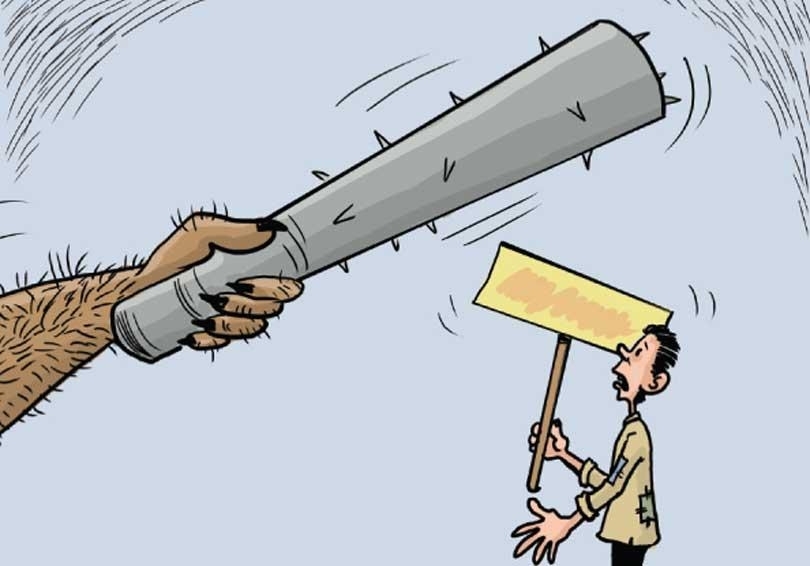Tackle the root causes for the dissent

The government or the ruling Sri Lanka Podujana Peramuna (SLPP) cannot absolve themselves from the responsibility for the riots that erupted in front of Temple Trees and the Gall Face Green yesterday, where peaceful anti-government protests have been going on for the past one month. It was obvious that the thugs who attacked the peaceful protests were government supporters, and the leaders of the government must take responsibility for the attacks and other untoward incidents that followed the attacks.
It would be extremely difficult if not impossible for the government and the ruling SLPP to justify the attacks on the protesters as the agitators have been incredibly peaceful for the past one month, despite so many provocations on the part of the politicians of the ruling party and some irresponsible police officers. The manner in which the protesters conducted the protests had been commended by Ambassadors of many countries. Reminding the German unification back in 1989 the German Ambassador Holger Seubert had recently stated that he was “impressed with how peaceful the proud people of Sri Lanka are exercising their right to freedom of expression” and wished “all parties involved the strength to remain peaceful.”
Yet, President Gotabaya Rajapaksa imposed a state of emergency on Friday following the strike action on Thursday by more than 1,000 trade unions against the skyrocketing prices, scarcity of essential items and hours-long power cuts and also in support of the people protesting in various places including Galle Face. Then in an apparent expression of the displeasure of the President’s action, the Resident Coordinator for the United Nations in Sri Lanka Hanaa Singer- Hamdy posted a message on her Twitter account which also an appreciation of the peaceful nature of the protests. These observations by the envoys of powerful countries and the UN would be a logical condemnation of the attack on the peaceful protesters.
Hence, the leaders of the government or the SLPP cannot justify the attacks in any manner. This is not a time that the authorities would be able to stop protests and demonstrations by way of suppressive means as in other ordinary times since people did not resort to protests this time just for political reasons. The current protests are a result of people’s rage prompted by their suffering due to economic hardships. Hence, suppressive actions would inevitably be counterproductive and as the Resident Coordinator for the United Nations in Sri Lanka had pointed out in her Twitter post cited above, the “Root causes for dissent must be tackled.”
President Rajapaksa responding to the Galle Face attacks said last afternoon in a Twitter post that he “Strongly condemns the violent acts taking place by those inciting & participating, irrespective of political allegiances. Violence won’t solve the current problems.” The phrase “irrespective of political allegiances” in a way indicates his acknowledgement of the responsibility of his party to the Galle Face riots. The onus now lies with him to take action, especially against those who “incited” the violence. He must recall that the failure on the part of the previous Rajapaksa government to conduct impartial investigations into many political murders that took place during that government ultimately held the leaders of that government responsible for them.
Mahinda Rajapaksa, who stepped down as the Prime Minister amidst violence yesterday, said in a Twitter post before his resignation that people must “exercise restraint & remember that violence only begets violence.” However, he as the leader of the SLPP must know where those thugs emerged from just before they launched the attacks as it is his party that is being blamed for the attacks. The media openly said that it was the people who were taken to his official residence, the Temple Trees by local politicians who attacked the two protest sites in front of the Temple Trees and the Galle Face Green.
It is not clear if the leaders of the government have realised the possible International backlash of the violence that might follow at a time when the government is being pressed to prove political stability in the country before the IMF is convinced to assist Sri Lanka. They would end up in utter failure if they attempt to claim that “extremists” among the protesters or some other elements were behind the riots, as they did in the wake of the protests in front of the President’s private residence on March 31. Already the US Ambassador to Sri Lanka Julie Chung has condemned the “violence against peaceful protestors” and called on the government to conduct a full investigation, including arrest and prosecution, of “anyone who incited violence.”
We also join hands with the Resident Coordinator for the United Nations in Sri Lanka to stress the government to tackle the root causes of the dissent.
